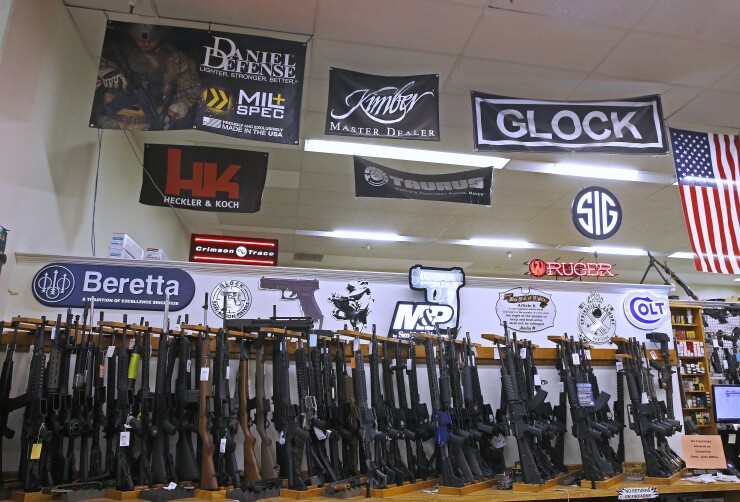
The large U.S. card networks may be building a merchant code for firearm and ammunition purchases in California — a move which could draw fire from other states where conservative lawmakers have worked to block such codes.
Visa, Mastercard and American Express are moving ahead with the transaction codes, according to
The International Standards Organization created the codes to generally categorize a merchant's primary business as a gun seller. The payment companies had considered adding the codes in the but
California's law likely means the card networks would have to have different compliance policies in different states. That's not unusual, but it does place the companies in the middle of a political fight during an election year, given California's size and its ability to influence federal policy and laws in other states.
"Our increasingly fraught and fractious politics are playing out at the state level with hard blue states like California and red states imposing their policy preferences on our payment system," said Eric Grover, a principal at Intrepid Ventures. "National payment systems are going to have to navigate a patchwork of conflicting state-level requirements."
Payment networks and processors will be able to manage the differences, but it will increase the cost and complexity of running their businesses, Grover said. He predicted that policymakers in liberal states such as California and New York will increase tracking and the burden on payments for firearms. "Many pro-Second Amendment red states will ban or limit such tracking," Grover said.
California's law could influence policy elsewhere.
There has been a link between California's early actions on consumer protection regulations and subsequent actions by other states and the Consumer Financial Protection Bureau, according to said Stewart Watterson, a strategic advisor at Datos Insights.
California's
These laws have
"Overall, California's early actions in consumer protection have set a precedent and spurred other states and federal agencies to follow suit in enhancing consumer privacy and financial regulations," Watterson said.
California has been a trendsetter on both conservative and liberal issues, according to Robert Hockett, a law professor at Cornell University, noting tax reforms in California have spread to other states as well as minimum-wage hikes.
"At least as interesting as the effects upon other states in this case, as it happens, might be reactions from Congress, whose Republican members are probably already primed due to the moves in the insurance industry on guns," Hockett said. In 2023,
There is the potential that California's market size could affect other states, but on certain issues, especially hot-button issues like gun sales, California's outsize influence may not be enough to sway other states to follow suit, said James Wester, director of cryptocurrency and co-head of payments at Javelin Strategy & Research.
"Regulations will simply follow political fault lines," Wester said, adding that in terms of financial and payment regulation more generally, New York tends to be more influential given its role as a banking capital.
Large red states have also passed laws that either aimed for a national influence or indirectly created cross-state pressure.
"Regardless of which state leads on any particular issue, however, this move by California on this [gun] issue demonstrates the complexity of compliance that payment and financial services providers must deal with," Wester said.






